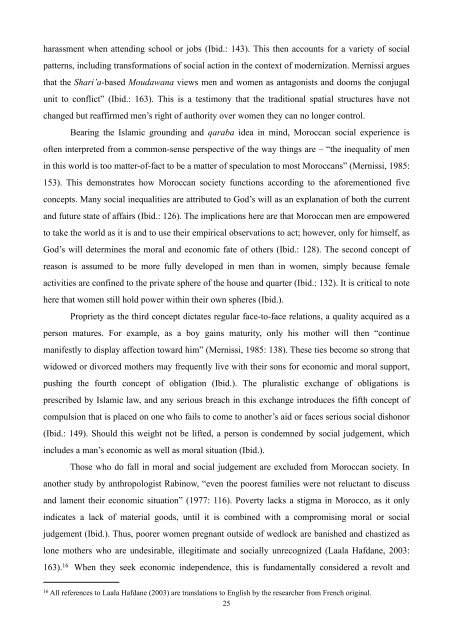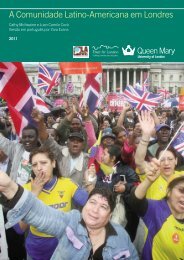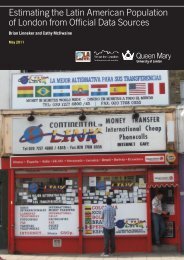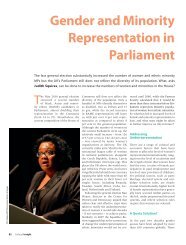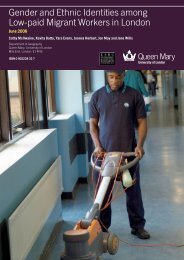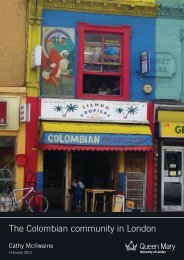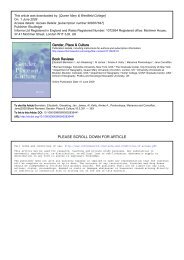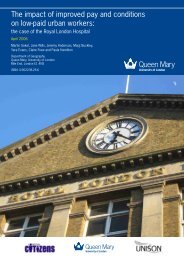Women's Empowerment and the Feminization of Poverty among
Women's Empowerment and the Feminization of Poverty among
Women's Empowerment and the Feminization of Poverty among
- No tags were found...
You also want an ePaper? Increase the reach of your titles
YUMPU automatically turns print PDFs into web optimized ePapers that Google loves.
harassment when attending school or jobs (Ibid.: 143). This <strong>the</strong>n accounts for a variety <strong>of</strong> socialpatterns, including transformations <strong>of</strong> social action in <strong>the</strong> context <strong>of</strong> modernization. Mernissi arguesthat <strong>the</strong> Shari’a-based Moudawana views men <strong>and</strong> women as antagonists <strong>and</strong> dooms <strong>the</strong> conjugalunit to conflict” (Ibid.: 163). This is a testimony that <strong>the</strong> traditional spatial structures have notchanged but reaffirmed men’s right <strong>of</strong> authority over women <strong>the</strong>y can no longer control.Bearing <strong>the</strong> Islamic grounding <strong>and</strong> qaraba idea in mind, Moroccan social experience is<strong>of</strong>ten interpreted from a common-sense perspective <strong>of</strong> <strong>the</strong> way things are – “<strong>the</strong> inequality <strong>of</strong> menin this world is too matter-<strong>of</strong>-fact to be a matter <strong>of</strong> speculation to most Moroccans” (Mernissi, 1985:153). This demonstrates how Moroccan society functions according to <strong>the</strong> aforementioned fiveconcepts. Many social inequalities are attributed to God’s will as an explanation <strong>of</strong> both <strong>the</strong> current<strong>and</strong> future state <strong>of</strong> affairs (Ibid.: 126). The implications here are that Moroccan men are empoweredto take <strong>the</strong> world as it is <strong>and</strong> to use <strong>the</strong>ir empirical observations to act; however, only for himself, asGod’s will determines <strong>the</strong> moral <strong>and</strong> economic fate <strong>of</strong> o<strong>the</strong>rs (Ibid.: 128). The second concept <strong>of</strong>reason is assumed to be more fully developed in men than in women, simply because femaleactivities are confined to <strong>the</strong> private sphere <strong>of</strong> <strong>the</strong> house <strong>and</strong> quarter (Ibid.: 132). It is critical to notehere that women still hold power within <strong>the</strong>ir own spheres (Ibid.).Propriety as <strong>the</strong> third concept dictates regular face-to-face relations, a quality acquired as aperson matures. For example, as a boy gains maturity, only his mo<strong>the</strong>r will <strong>the</strong>n “continuemanifestly to display affection toward him” (Mernissi, 1985: 138). These ties become so strong thatwidowed or divorced mo<strong>the</strong>rs may frequently live with <strong>the</strong>ir sons for economic <strong>and</strong> moral support,pushing <strong>the</strong> fourth concept <strong>of</strong> obligation (Ibid.). The pluralistic exchange <strong>of</strong> obligations isprescribed by Islamic law, <strong>and</strong> any serious breach in this exchange introduces <strong>the</strong> fifth concept <strong>of</strong>compulsion that is placed on one who fails to come to ano<strong>the</strong>r’s aid or faces serious social dishonor(Ibid.: 149). Should this weight not be lifted, a person is condemned by social judgement, whichincludes a man’s economic as well as moral situation (Ibid.).Those who do fall in moral <strong>and</strong> social judgement are excluded from Moroccan society. Inano<strong>the</strong>r study by anthropologist Rabinow, “even <strong>the</strong> poorest families were not reluctant to discuss<strong>and</strong> lament <strong>the</strong>ir economic situation” (1977: 116). <strong>Poverty</strong> lacks a stigma in Morocco, as it onlyindicates a lack <strong>of</strong> material goods, until it is combined with a compromising moral or socialjudgement (Ibid.). Thus, poorer women pregnant outside <strong>of</strong> wedlock are banished <strong>and</strong> chastized aslone mo<strong>the</strong>rs who are undesirable, illegitimate <strong>and</strong> socially unrecognized (Laala Hafdane, 2003:163). 16 When <strong>the</strong>y seek economic independence, this is fundamentally considered a revolt <strong>and</strong>16All references to Laala Hafdane (2003) are translations to English by <strong>the</strong> researcher from French original.25


